Kashmir, the land of shawls, snow and sun,
Was being eaten by Afghans like a bun.
excerpt from “History of Sikhs (Vol V)” by Hari Ram Gupta
A little known fact is that if not for the ambition of Maharajah Ranjit Singh (Lion of Punjab, who ruled from 1799 AD – 1839 AD), to expand his empire into Kashmir, today this region would be part of Afghanistan.
Prior to 14th century, Kashmir had witnessed the Vedic period evolve into Buddhism, followed by Kashmir Shaivism and then around 14th century, under spiritual guidance of Sheikh Nooruddin Noormai (Baba Reshi), Islam started gaining ground. Between 1354 AD – 1540 AD, various Sultans ruled Kashmir. Then in 1540 AD, the central Asians stepped into the valley, when Mirza Muhammad Haidar Dughlat invaded on behalf of Mughal emperor, Humayun, thus starting the era of Mughal rule.
In 1738 AD, Emperor Nadir Shah, the Shah of Iran (who ruled from 1736 AD – 1747 AD) and founder of Afsharid dynasty, invaded India with a fifty-thousand strong army, weakening the foundation of Mughal empire. This subsequently paved the way for Ahmed Shah Durrani (ruled Afghanistan from 1747 AD – 1772 AD) to invade Kashmir in 1753 AD and expand the reaches of Durrani Empire of Afghanistan.
Kashmir had now become a part of Afghanistan.
It was in the year 1819 AD, the Sikh king, Maharajah Ranjit Singh of Punjab, having pushed the Afghans out of Punjab, establishing the western frontier of his empire at Peshawar (Pakistan), now turned his full attention northwards towards Kashmir. His objective was to reclaim Kashmir from the Afghans.
In 1814 AD, Ranjit Singh had led a failed expedition to Kashmir and retreated from Tosamaidan pass. It took him four years to overcome this defeat. In 1819 AD, he sent a force under Diwan Chand, leading to ousting of the Durrani Afghanis from Kashmir and making it a part of the Sikh empire. The boundaries of the Sikh empire now extended from Peshawar on the West to river Sutlej in East (where British India started) and from Multan in South, to Kashmir in the North.
The Sikh rule in Kashmir lasted from 1819 AD till 1846 AD. Ranjit Singh was a liberal ruler, in whose cabinet there was a representation in high posts from both Hindu and Muslim community. His Prime Minister was Dhian Singh, the Dogra Hindu King of Jammu, whom he trusted the most. Dhian Singh’s brother, Gulab Singh, a Dogra Hindu was a commander in Ranjit Singh’s army. After the demise of Ranjit Singh, Gulab Singh deceived the Sikh kingdom by secretly joining hands with British to cut off the military supplies to Sikh army fighting the British at river Sutlej in 1846 AD. In exchange, for helping British win over Sikhs, Gulab Singh Dogra was given an independent title of Kashmir. The Sikh kingdom was thereafter annexed into British India empire in the year 1846 AD.
Reflecting back, Maharajah Ranjeet Singh’s victory over Kashmir in 1819 AD is the reason why Kashmir today finds a place in the map of India. With annexation of Sikh empire by British in 1846 AD, the region of Kashmir also came under jurisdiction of British. Thereafter during independence of India in 1947 AD, Kashmir moved to India, though remaining disputed between Pakistan and India.
However, if not for Ranjit Singh’s victory of the Durrani Afghan rulers in 1819 AD, Kashmir would have remained a part of Afghanistan and history today would have been very different.
Hari Parbat, is a hill overlooking Srinagar. Due to hills vantage point, during the Shuja Shah Durrani’s Afghanistan rule of Kashmir in 1808 AD, a large fort was built on the hill to provide strategic defense to the city. The Durrani flag was hoisted in the fort, till Maharajah Ranjit Singh, replaced it by hosting the Sikh flag in the year 1819 AD.
I had heard that inside the fort there is a small Gurudwara (Sikh place of worship) which was built in 1820 AD by the Sikh Governor of Kashmir, General Hari Singh Nalwa. In current times, due to militancy threats and occupation of the fort by Indian Defense forces, rarely does anyone from the local Sikh population visit the Gurudwara inside the fort. On enquiry, we were able to find a local Sikh man willing to take us to the top of the hill and he assured that the Gurudwara is still operational, though managed by the personnel of Indian Defense force.
I was glad to be able to reach the top of the hill and was delighted to find a small Gurudwara still existing inside the fort. A single Sikh from Indian Police Reserve force maintains the Gurudwara, performing the daily services. He was kind enough to read us a hymn from the Holy Granth and distribute Prashad (offering). Time has progressed but the victory of Kashmir by Maharajah Ranjit Singh in the year 1819 AD is today, symbolically represented through the fluttering Nishaan Sahib (Sikh flag) hosted on top of the Gurudwara, right inside this fort.
I felt proud of this contribution to modern India by my community!
In the photo series below, I am sharing what I saw at Hari Parbat fort.
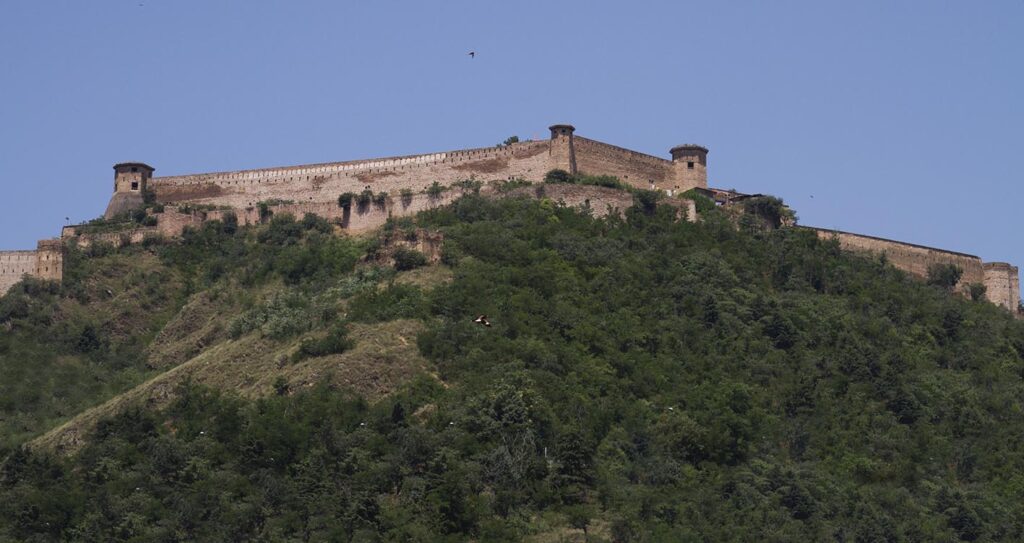
Photo : Hari Parbat fort on top of the hill. Positioned strategically, overlooking into Srinagar city.
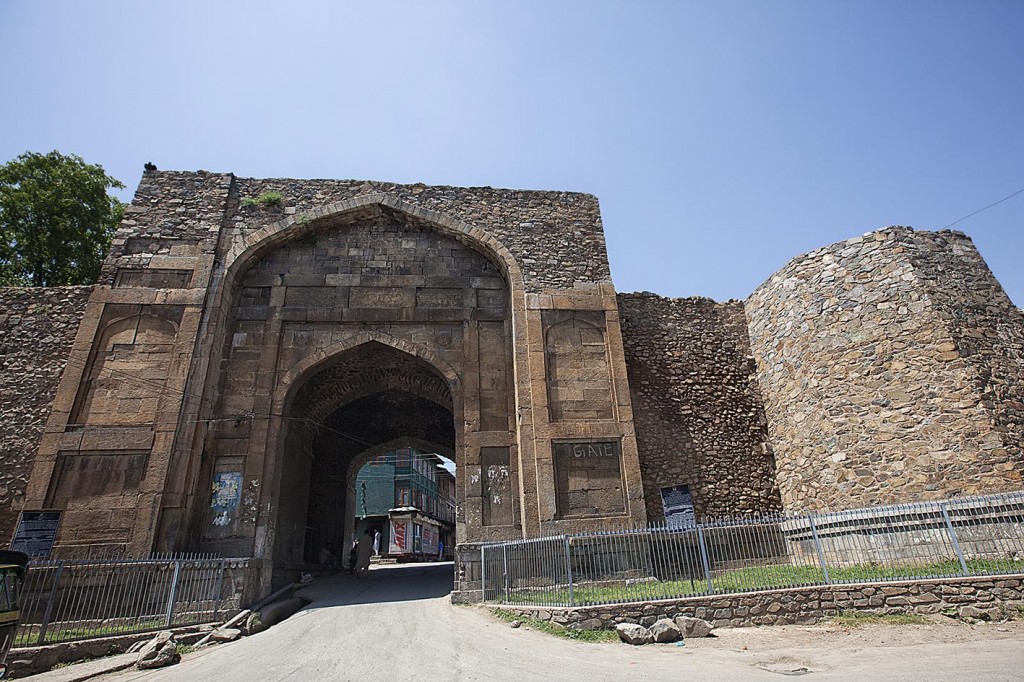
Photo : Gate that leads to the hill, which then has to be ascended to reach the Hari Parbat fort.
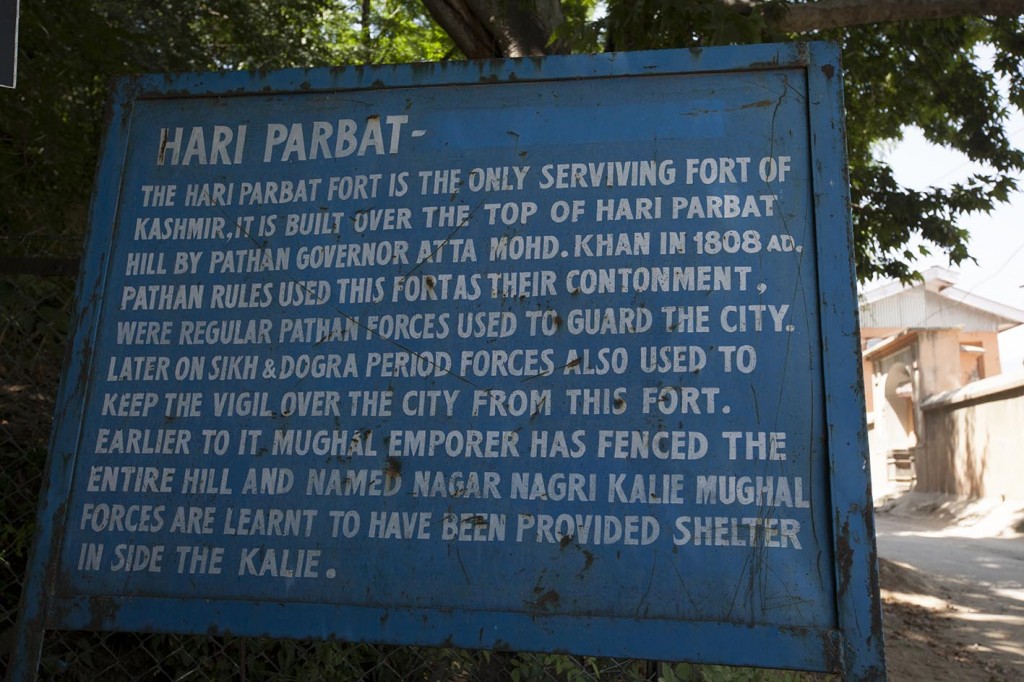
Photo : History awareness board, just outside the Hari Parbat fort.
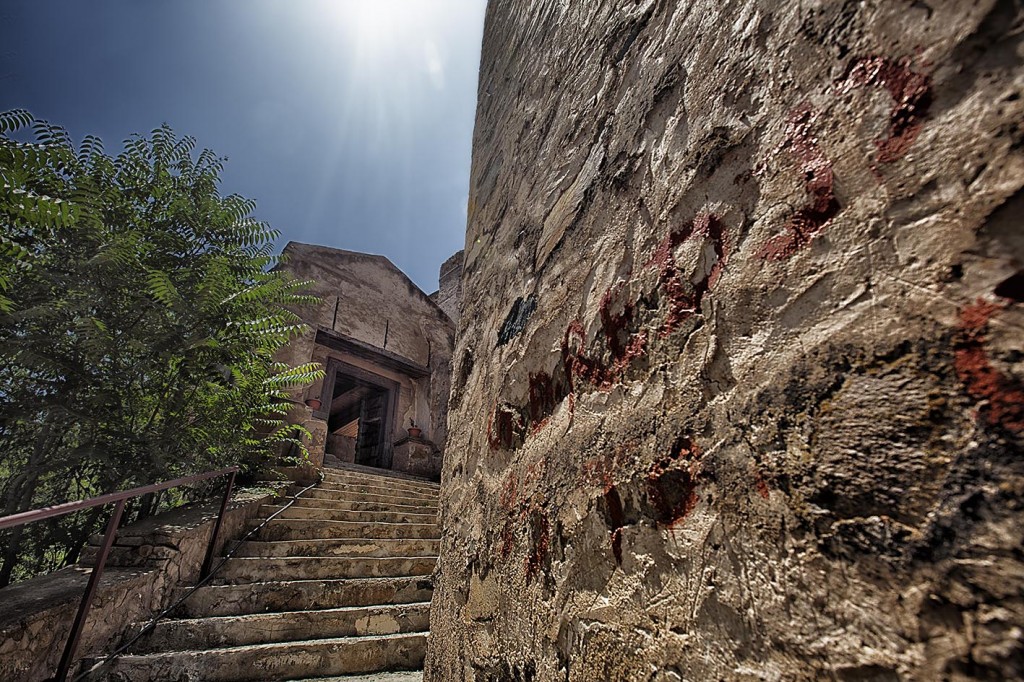
Photo : Stairs leading to Hari Parbat fort.
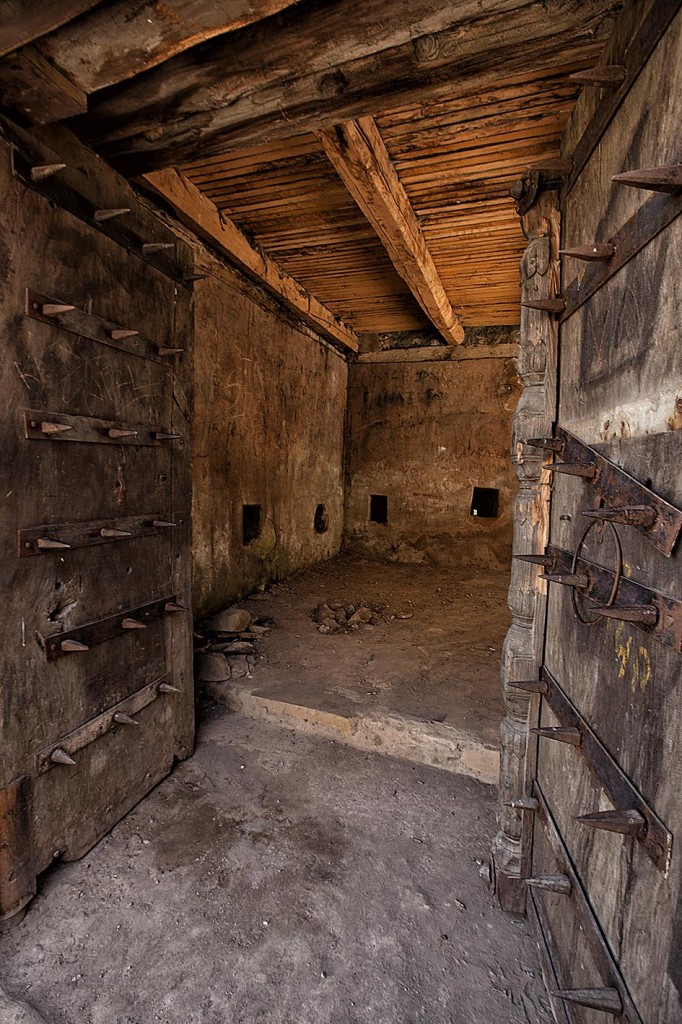
Photo : Nailed doors to protect from elephants breaking the entrance.
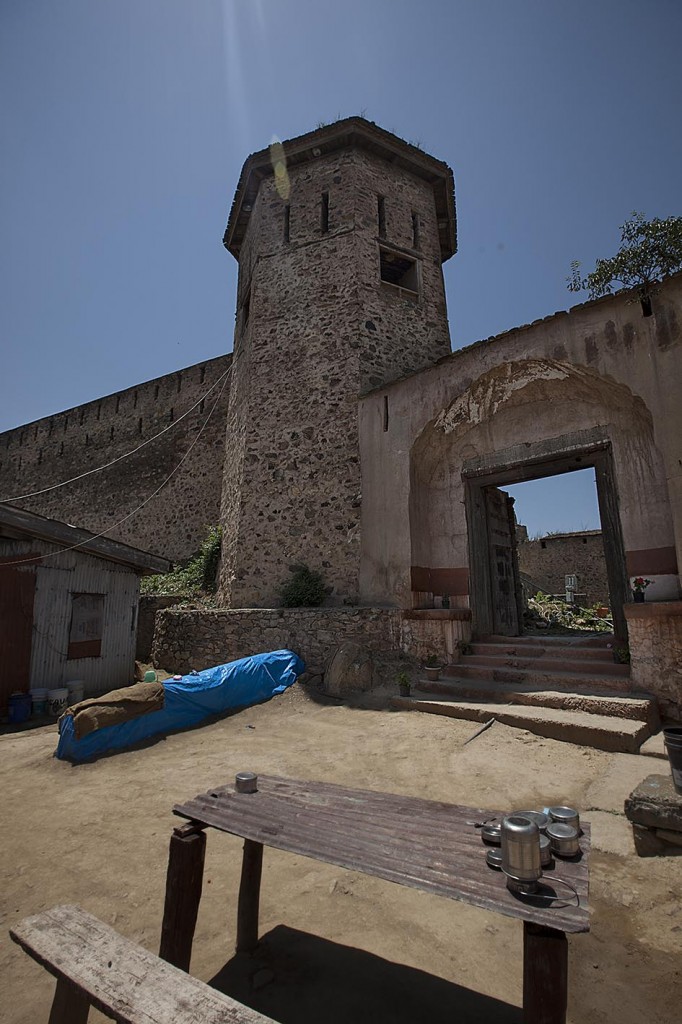
Photo : Entrance to Hari Parbat fort.
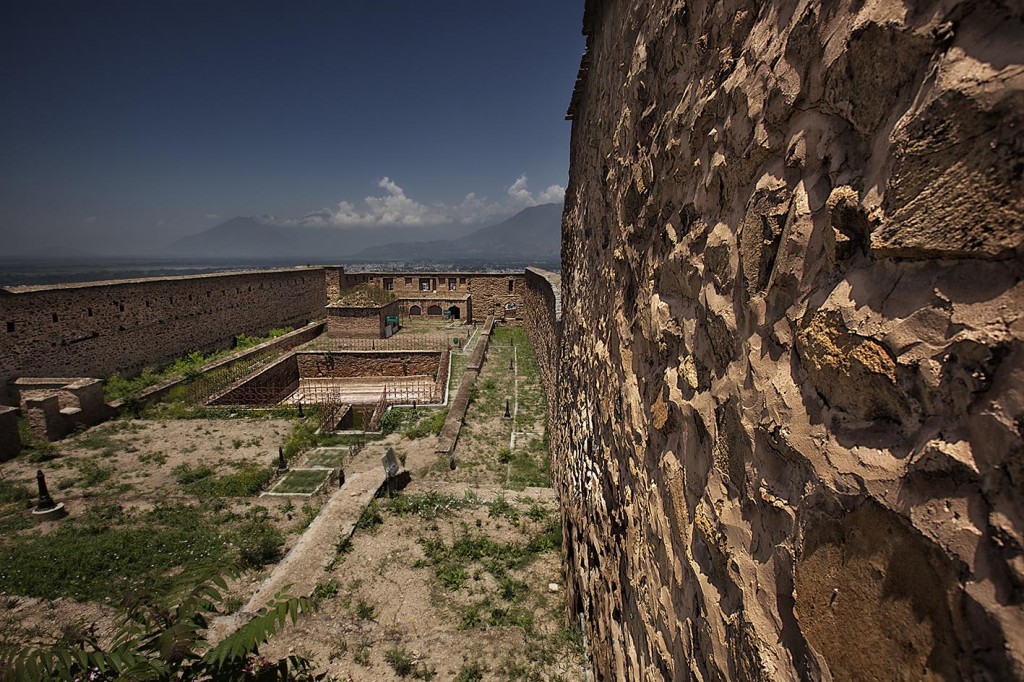
Photo : Inside view of Hari Parbat fort. In the centre is a mosque.
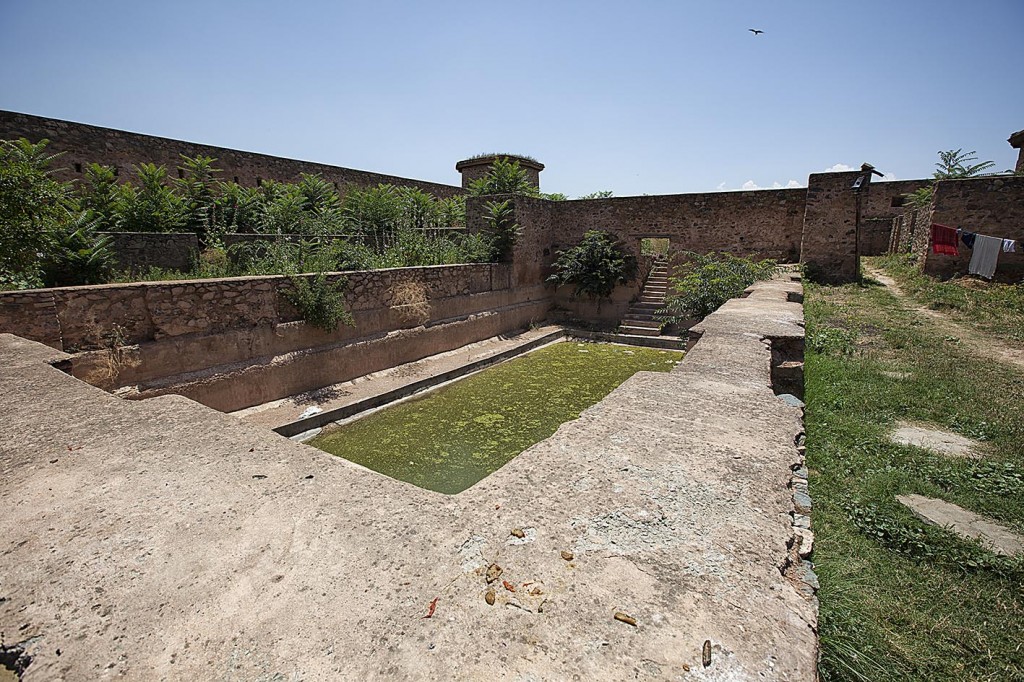
Photo : Bathing pool inside Hari Parbat fort.

Photo : Watch tower at Hari Parbat fort.

Photo : Alley inside Hari Parbat fort.

Photo : Watch tower at Hari Parbat fort.
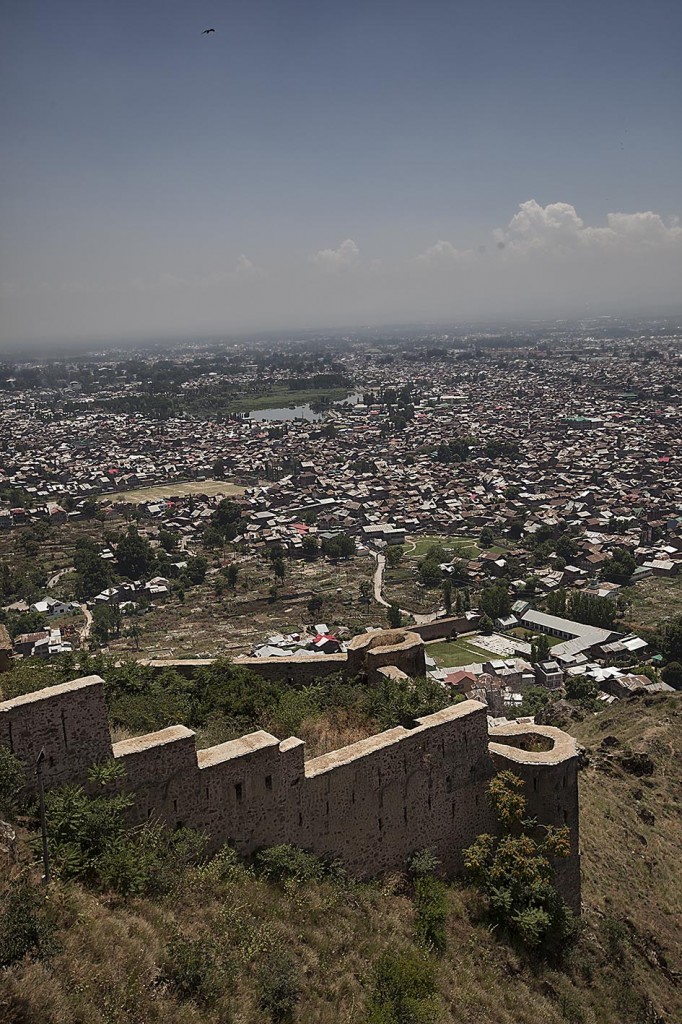
Photo : Boundary wall of Hari Parbat fort, overlooking Srinagar city.
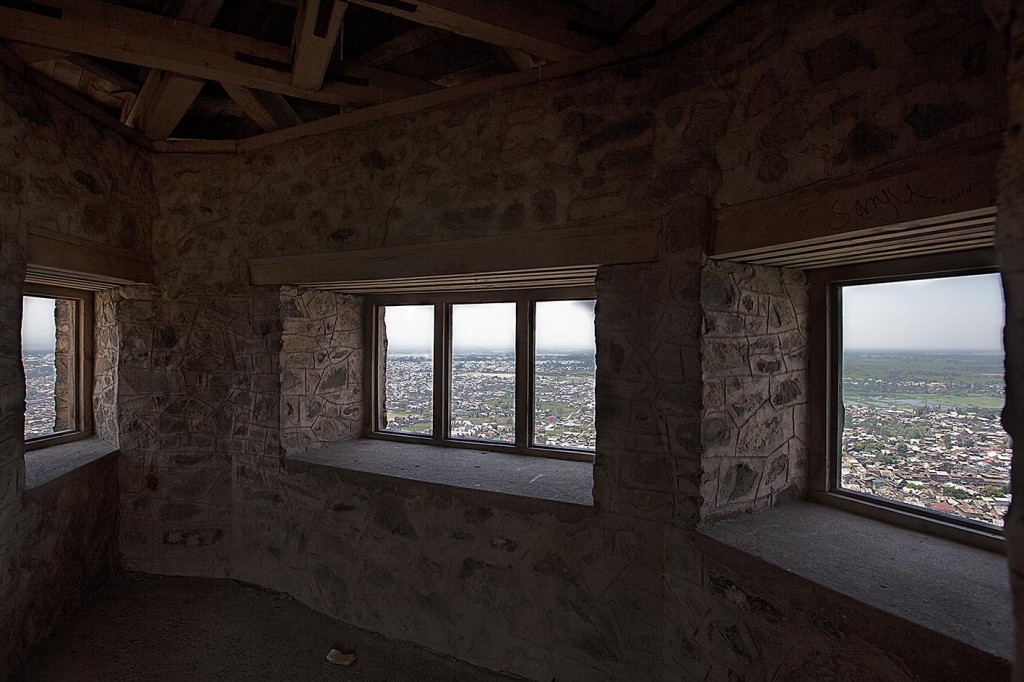
Photo : View of Srinagar city from the Hari Parbat fort watch tower.
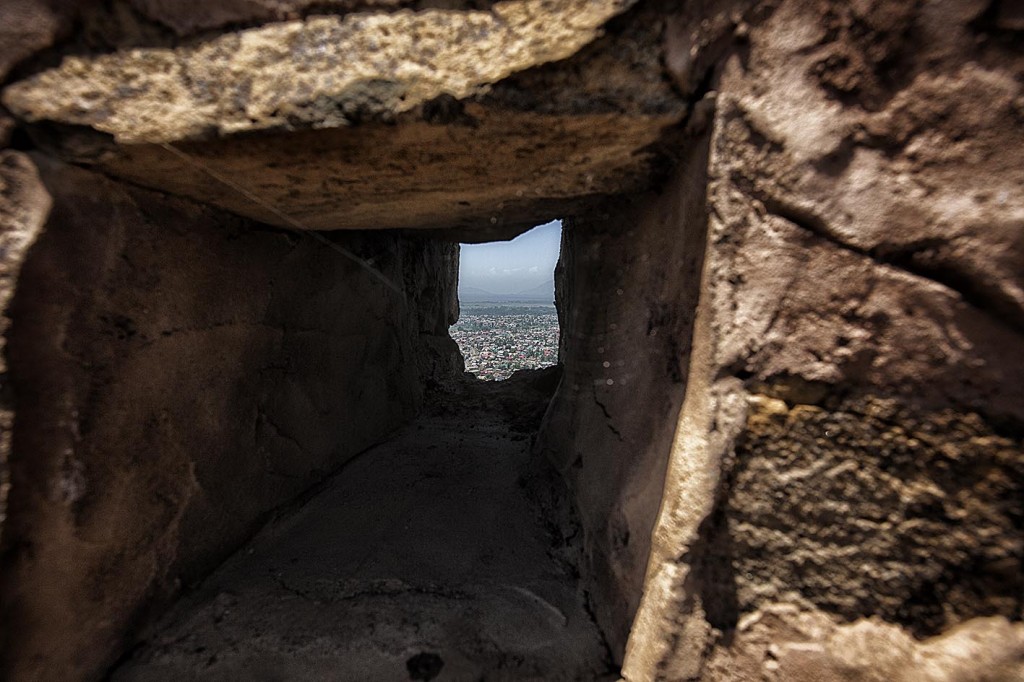
Photo : View of Srinagar city from gun firing hole in the walls of Hari Parbat fort.
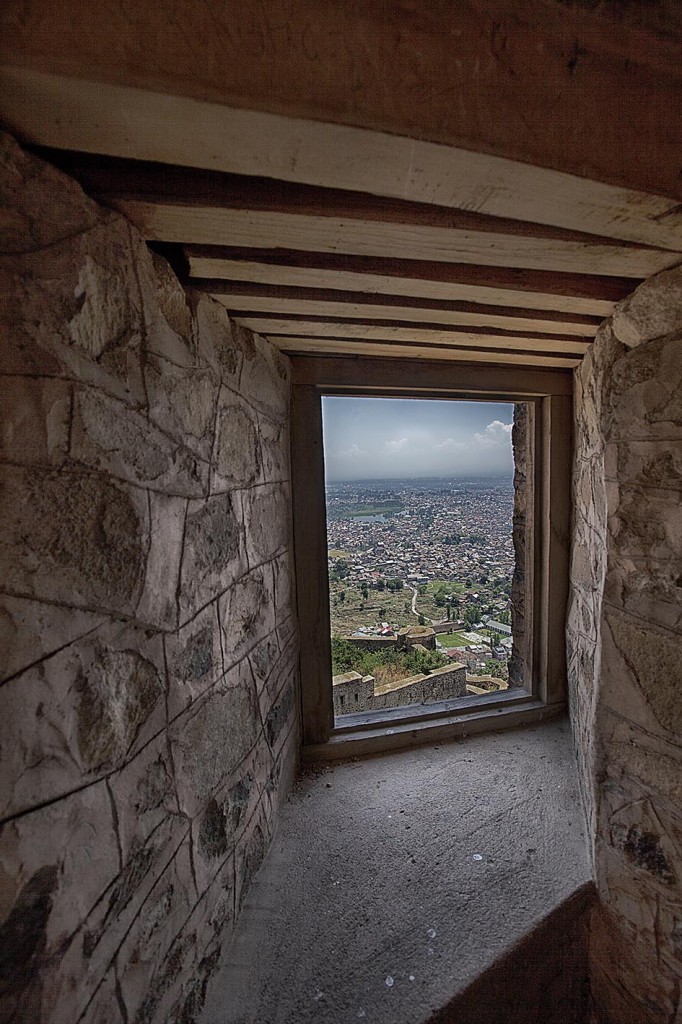
Photo : View of Srinagar city from the Hari Parbat fort watch tower.
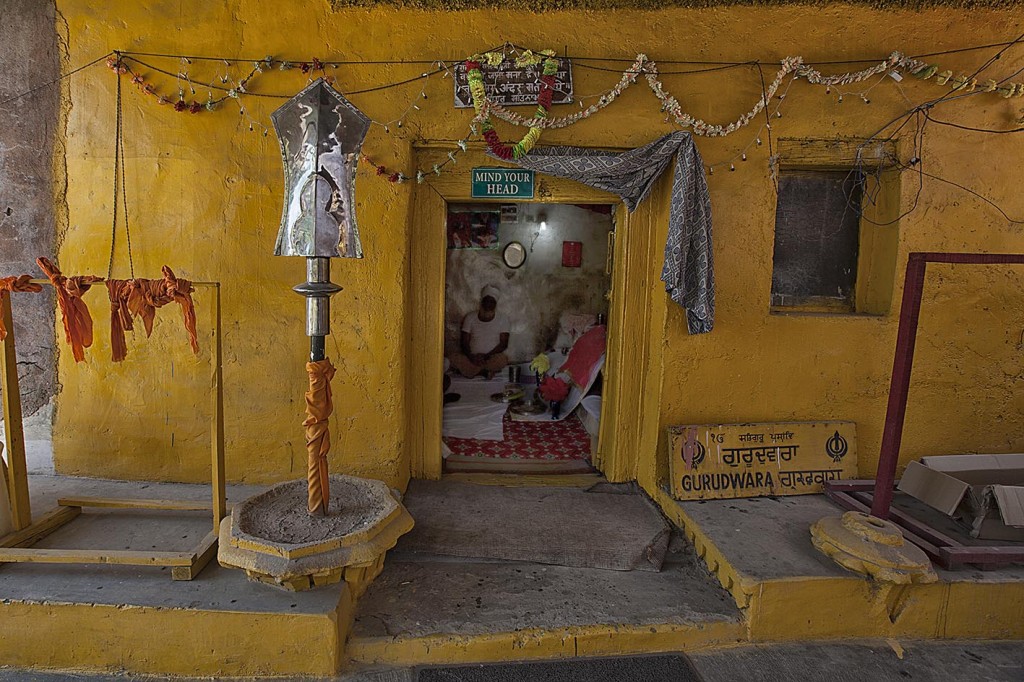
Photo : Sikh Gurudwara inside Hari Parbat fort.
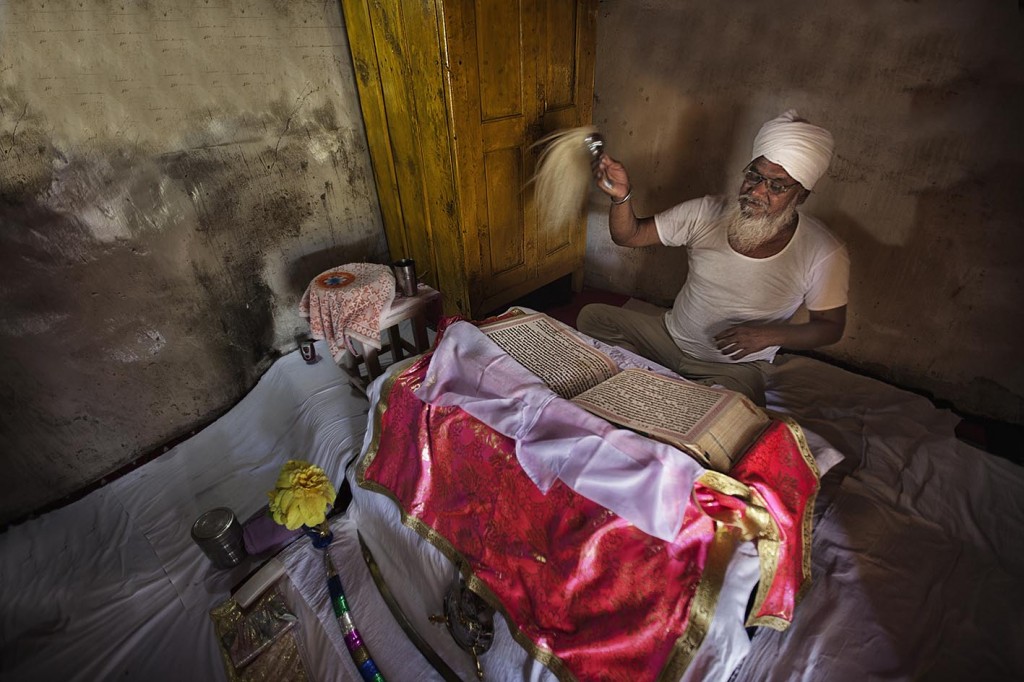
Photo : Sikh policeman maintains the Hari Parbat Gurudwara, inside the fort.
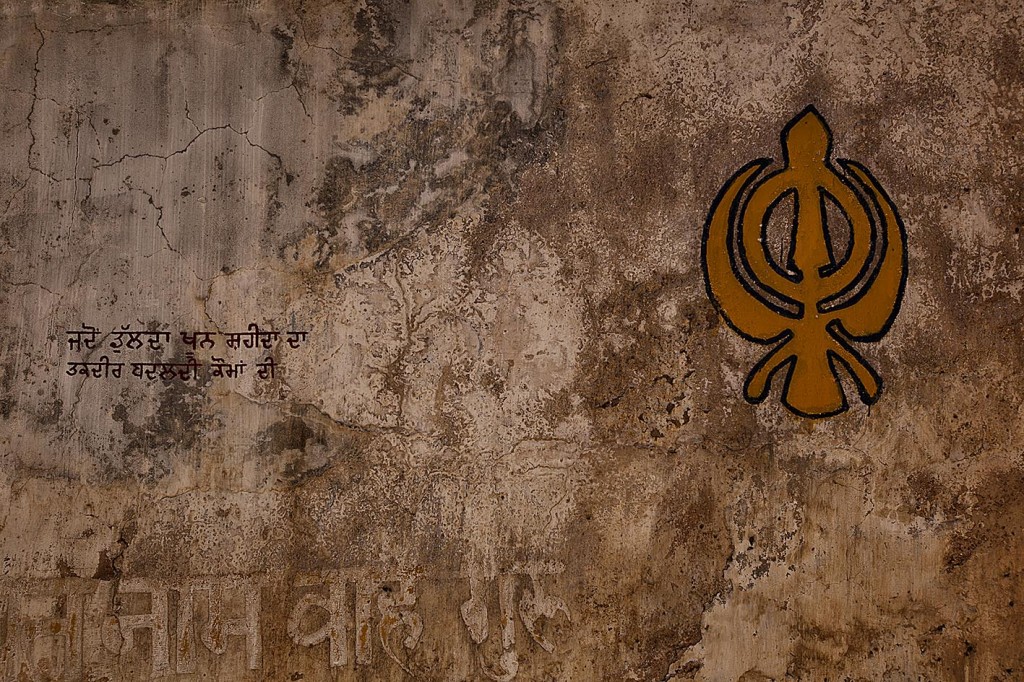 Photo : In remembrance of the soldiers who died in liberating Kashmir from the Afghan rule. The writing on the wall inside the fort reads, “Spilling blood of martyrs forms the fate of a nation”.
Photo : In remembrance of the soldiers who died in liberating Kashmir from the Afghan rule. The writing on the wall inside the fort reads, “Spilling blood of martyrs forms the fate of a nation”.
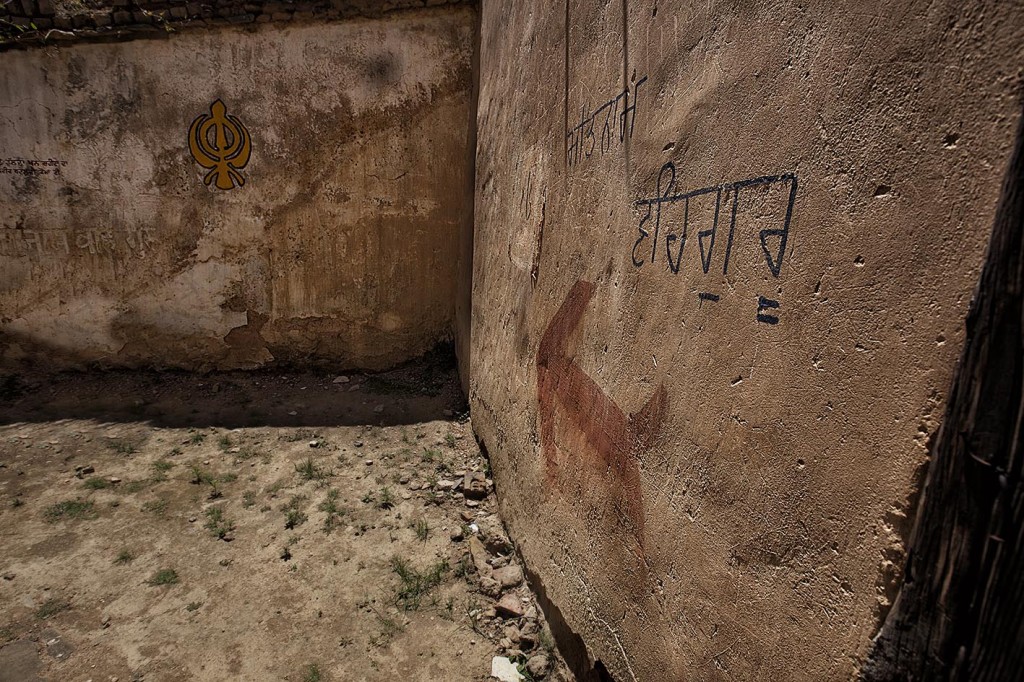
Photo : Satnam Waheguru (God is Truth & attained through Guru’s Grace) written on the walls, inside the fort, close to Gurudwara
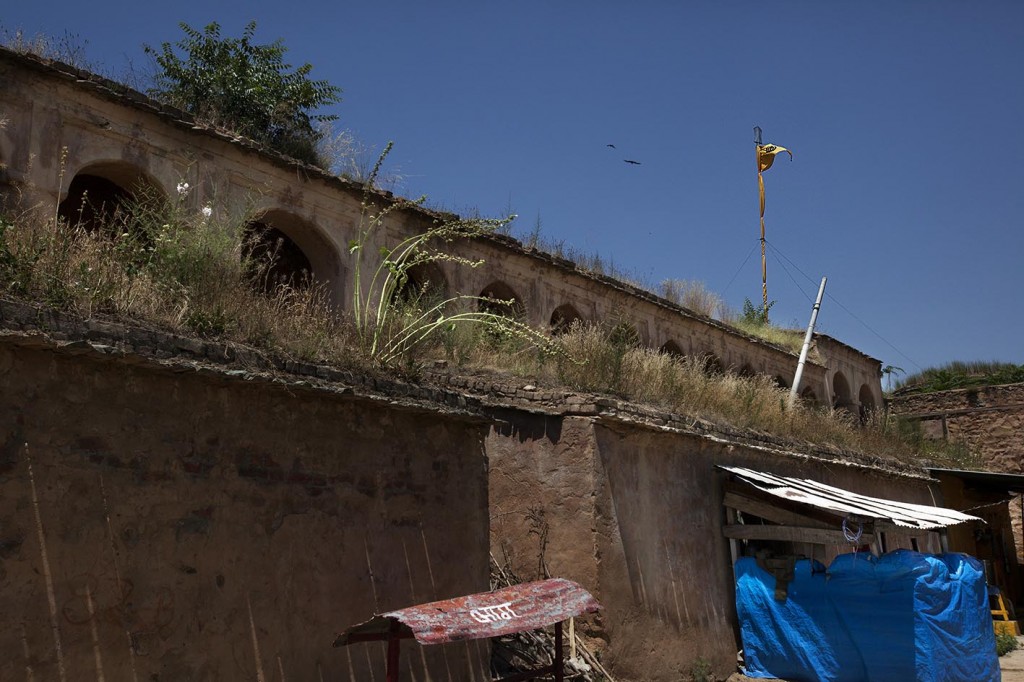
Photo : The Sikh flag (Nishaan Sahib) on the fort.
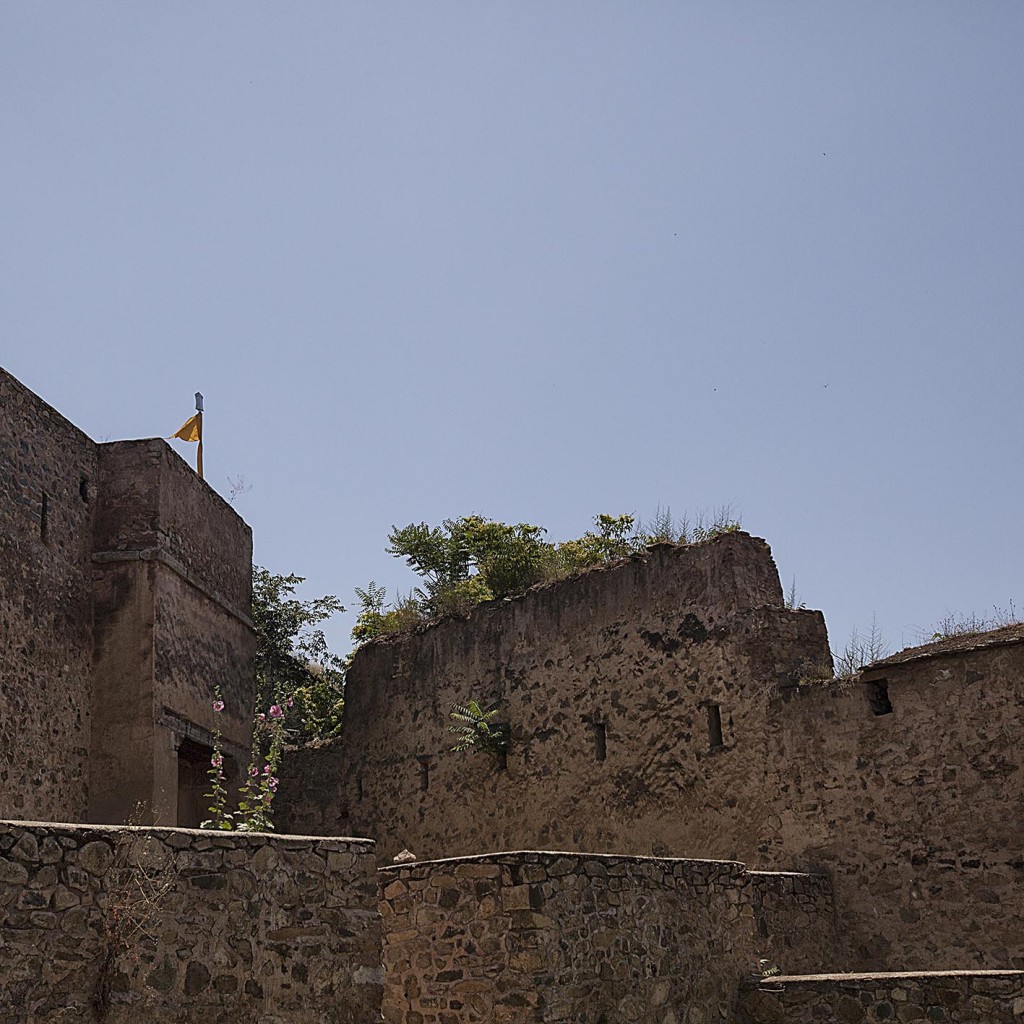
Photo : The Sikh flag (Nishaan Sahib) on the fort.

Comments(75)
Ratinder Aujla says:
September 30, 2014 at 3:59 pmThis is so amazing! Thanks Amardeep Singh
Racchit Thapliyal says:
September 30, 2014 at 4:00 pmLove it! Your posts click with so many of my intellectual interests Have you ever thought of collating your “photo (hi-)stories” into a book? I;d buy it for sure!
Milton D'Silva says:
September 30, 2014 at 4:33 pmAnother fascinating photo feature by Amardeep Singh! Thanks!!
Geetali Tare says:
September 30, 2014 at 4:40 pmAmazing photos and write-up as always, Amardeep Singh.
Mohindra Chadha says:
September 30, 2014 at 5:36 pmDear Amardeep,
Your photographs, as always are amazing! Your prose which accompanies the photo gallery shows your knowledge of Sikh history and also your in depth knowledge of whatever locale/topic you choose for your photographs.
You are a real scholar and an outstanding photographer. Wish you further success in your wonderful pursuits!
I am sure all your pictures and thoughts will one day translate into a valuable book/compilation.
Best wishes- Uncle
Karamjeet Singh says:
September 30, 2014 at 7:17 pmAmazing facts through your lens and writeup.Probably victory over Kashmir led Ranjit Singh to further expansion towards Ladakh and western Tibet under Gen.Zorawar Singh that helped to form the new boundary line between India and China.Gen Hari Singh Nalwa’s contribution is immense to push the frontiers towards west and north of Punjab. Thanks for the history lesson and nice and clear pictures.Good going as always!!!
Amardeep Singh says:
September 30, 2014 at 7:24 pmIndeed Karamjeet. Beyond Kashmir the frontiers were then expanded in successful expeditions by Sikh armies to Ladakh and Baltistan. The final frontier push into Tibet by Zorawar Singh, still when he was under the Maharajah Ranjeet Singh’s army, was the last failed battle of the great warrior….Zorawar Singh. I had covered his expeditions earlier in link below. http://amardeepphotography.com/general-zorawar-singh/
Harbans Singh Khakh says:
September 30, 2014 at 8:17 pmWonderful rendition of how Kashmir was wrested from Afghanistan. And really great photos. Thanks Amardeep. You’re great!
Jaideep Sahney says:
September 30, 2014 at 8:37 pmVery nice Amardeep!
bikram says:
September 30, 2014 at 8:57 pmHistory of sikhs in kashmir is not presented in right tone by the present day writers . Either they dont acknowledge the contribution of sikhs in kashmir or it is distorted. thanks for a masterpiece.
Ranjit Singh says:
September 30, 2014 at 9:41 pmWow Excellent write-ups and marvelous pictures.
The more I get to know you the more I admire your impartial commentary. May Waheguru ji bless you with long life and lots of happiness
Raj Mehta says:
September 30, 2014 at 9:48 pmBrilliant write up…Excellent pics as usual…Compliments, Amardeep!
Moninder Singh Modgil says:
September 30, 2014 at 10:59 pmInteresting how historical narrative messes into modern photography.
Inderjeet Singh says:
October 1, 2014 at 4:58 amExcellent work Amardeep. I agree with Racchit and Mr Chadha that you should compile your work on Sikhs in a book. Pakistan owes to Maharaja Ranjit Singh that Peshawar and NWFP is part of their country and not Afghanistan. Wahe Guru Ji aap nu chardi kala vich rakhan.
Ajay Shukla says:
October 1, 2014 at 6:00 amAmazing story and facts we didn’t know but SHOULD know. Thanks for sharing and may the force be with you as you seek to uncover the truth.
Mandeep says:
October 1, 2014 at 8:39 amAmardeep Singh, one of my ancestors were instrumental in the conquest of Kashmir as a General in Ranjeet Singh’s army and defeated and killed Mian Kishora Singh, the conniving Dogra -father of Gulab Singh.He fought with Hari Singh Nalwa and had to his credit the victories of Kasur, Multan, Peshawar, Kashmir and Jamrud.
laxman tupari says:
October 1, 2014 at 9:05 amwhy cannot they call sikhistan when maharaja ruled.
Bhupinder Singh says:
October 1, 2014 at 11:03 amthanks for taking us through the Hari parbat fort.
Harpreet says:
October 1, 2014 at 4:47 pmVeerjio
Is hari parbat different than jamrud quila
kishore kumar biswas says:
October 1, 2014 at 11:10 pmMesmerizing History of a glorious past. That has gathered dust in course of time . It is natural . But it is necessary for us to know our ” true identity ” with the help of History. Then we know how our tradition went through waves of incidents . How living and eventful it was.
Amardeep keeps himself engaged always to search his ” roots ” , our ” roots. We by the help from him are able to know our past , our tradition , our history . We can feel a ” flowing ” us that become the ” present ” us. Our present that actually runs from our past , our glorious past.It inspires to have self respect and make us self confident. A tree can stand straight with head held high when its roots are strong.
Parminder Kaur says:
October 2, 2014 at 5:57 amAmazing Photography and what a treat to learn about the Gurughar.
Mahesh Chander M.D.,F.A.C.P says:
October 2, 2014 at 6:05 amOne of the best & very informative. Jai Hind
Anwar Bakshi says:
October 3, 2014 at 10:19 amThank you so much for enlightening us with this information.
I being from Kashmir , have never been up there.
The Hari Parbaht Fort is very famous and of great significance since it has a temple on one side, a shrine of Mahkhdoom Baba on the other side and the largest Gurdawara Chatti Padshahi at the entrance on the rear side, from where most of the people approach it.
Ajay Pal Singh says:
October 7, 2014 at 11:17 pmAmazing peace of,work bieng a local sikh I even dosent know,so much proud,history,of our,sikh community
Vijay Kumar says:
October 7, 2014 at 11:19 pmThanks for sharing I walked up there as a student in 1961 first time
Ninder Singh Paglia says:
October 7, 2014 at 11:20 pmIndeed it is great article and the pictures. speaks for itself..
Malkit says:
October 7, 2014 at 11:20 pmVery educational article. Enjoyed the photos. Keep it up.
Khushpreet says:
October 7, 2014 at 11:21 pmNice to see that a piece of history recovered
jaspal says:
October 7, 2014 at 11:21 pmGreat articles…thanks for sharing and unwrapping unheard facts about Kashmir and Sikhs.
Sukhbir Singh says:
October 7, 2014 at 11:22 pmPrideful history, owesome article, keep it up Amardeep Singh.
Inderjeet Singh says:
October 7, 2014 at 11:23 pmIt was because of Maharaja Ranjit Singh and lakhs of Sikh Shaheeds that India is what it is today. It would have been much better had it not been divided due to political motives during 1947 and prior to that period. Still, the big reason behind United India are the Sikhs and the Guru’s teachings.
Abhinandan says:
October 7, 2014 at 11:24 pmNot only this,Maharaja Ranjeet Singh contributed 1 tonne gold for Kashi Temple.Sikhs are unsung heroes of India,
Gurnam Bhodey says:
October 7, 2014 at 11:27 pmNO MATTER WHO U ARE. THIS IS A MUST READ. I am SPELL BOUND.
Amitabh Monga says:
October 8, 2014 at 3:10 pmDear Amardeep,
All I can say in my limited vocabulary is that you are “living” a life while the rest of us mortal beings are “existing”.
All the best for your trip to Pakistan. Looking forward to more enlightenment.
bnchhabria says:
October 10, 2014 at 9:13 pmwaheguruda khalsa waheguru di fateh.wonder ful and emotionally attractive make
the person activated.
bnchhabria says:
October 10, 2014 at 9:14 pmgood and the good.
bnchhabria says:
October 10, 2014 at 9:18 pmin this world where the person like MAHARAJA guru Gobindsinghji maharaj.Satnam
Wahegurji da khalsa WAHEGURUJI FATEH jo BOLE so NIHAL.
AMAR JIT SINGH says:
October 11, 2014 at 2:32 pmDEAR AMARDEEP
VERY GOOD EFFORT,SHARING HISTORY & WONDERFUL PHOTOGRAPHS.
j k bahri says:
October 11, 2014 at 2:53 pmi am thrilled to see this historic gurdwara sahib in fort on hari parbhat hill in SRINAGAR.the historical photos are amazing and description excellent and delightful.
jkbahri
Krishan Kumar Batta says:
October 11, 2014 at 3:30 pmI am spell bound to read this valuable article ,and recomend that it should be read by one and all.
Vinod Tuli says:
October 12, 2014 at 11:05 pmAN UNHEARD PART OF INDIAN AND SIKH HISTORY. GREAT ACCOUNT SUMMED UP FROM 1819 AD ONWARDS. THIS NARRATIVE IS EXCELLENT FRIENDS.
Lt Col Tikka MHS Bedi (Retd) says:
October 13, 2014 at 2:19 amSUCH RARE HISTORICAL INFORMATION, ABOUT THE SIKH COMMUNITY & THEIR FIGHT TO UPHOLD TRUTHFUL VALUES . WE ARE PRIVILEGED TO LEARN SUCH ANECDOTES, THAT RAISE OUR PRESTIGE LEVELS BY MANY RUNGS. INDEED A LAUDABLE EFFORT TO EDUCATE OUR PRESENT GENERATION.GOD BLESS YOU AMARDEEP, AND GOD BLESS OUR NATION. JAI HIND. Tikka Bedi.
Surupa Chatterjee says:
October 14, 2014 at 6:24 pmSuper history and super shots…once again very transporting… you are a master story teller….Cheers….Proud to have many friends from the Sikh faith….
Onkar Singh Goraya says:
October 15, 2014 at 2:23 pmThanks for educating all with little known facts of our history. It was a revelation to learn that but for Ranjit Singh’s campaigns Kashmir would have remained a pert of Afghanistan!What a great loss it would have been.
Could you put me in touch with Lt Col Tikka Bedi whose comment is given above?
VIJOY mathur says:
October 15, 2014 at 8:35 pmI hope this excellent coverage of a historical haritage inspires our people and govt to maintain and renovate the place. It is better to rejuvenate old heritage places of worship than building new grand temples. This place can become a tourist attraction in addition to a revered Gurudwara.
Col Baldev Dhillon says:
October 15, 2014 at 9:56 pmThanks for the write up and the photograph of the oldest gurudwara at the Fortin Srinagar.You have carried out a great service to the Sikh Community and also brought out the history of the Sikh Rule in Kashmir.
Vikram says:
October 15, 2014 at 10:47 pmI am glad to know that there are still Sikhs in Srinagar. What Maharaja Ranjit Singh achieved is amazing and is an inspiration to all Indians.
Dilip Desai says:
October 18, 2014 at 9:28 pmCommendable effort in compiling the strands of history. What is even more remarkable is the bold expansion towards Ladakh, Tibet and Baltistan by the military leaders and forces of the day
Ajeet Khalsa says:
October 19, 2014 at 5:03 amAs an American practicing Sikhism over these last 20 years, I find it fascinating to know the stories of empires and regions of India. Although I may never see them with my eyes, when I look at the Guruwara, I feel at home and seeing the saint sitting behind the Siri Guru Granth Sahib waving a choti, sends me into a smile.
Where ever we are, at whatever place, where this truth is accepted, therein God dwells. Sat Nam Waheguru.
Joy Bajaj says:
October 19, 2014 at 2:49 pmAn excellent piece of historical spadework. Need to promote it further. The gurdwara needs to be done up by SGPC. Your efforts are incredible! God Bless You!
Pankaj Khullar says:
October 19, 2014 at 9:44 pmThank you Amardeep for your excellent research and narration, as also for the lovely photographs. I had visited Hari Parbat in 1978 to see the plantations on the slopes overlooking Kashmir valley, saw the Fort walls, but could not visit the fort or the Gurudwara itself. Keep up the good work!
amarjeet kaur says:
October 19, 2014 at 10:14 pmAmardeep your photographs of Hari Parbatare very good . Literature of the victory of Maharaja Ranjit Singh and some failurs in history brings us back to that periods exactly.Amazing!You always bring very rare touched subjects. I liked and will read again .
JAGDISH says:
October 20, 2014 at 11:15 amTHANKS धन्यखवाद
धन्यKवाद एक शब्दद नहीं , यह भावनाओं की तरंग है जो मन से
स्वय-अवतरित होती हैं और कई बार इस में भावनाओं का सैलाब उमड़ पड़ता हैं जिस से प्राप्तिकर्ता और बाँटने वाले के मन में रंगबिरगें फूलों की खुशबूआती है और दोनों के मन में रूहानी ज्यो ति दीप जला देती है जिस मे से तरह तरह की रूहानी खुशबू आती है और और दोनों को रोमाचिंत कर देती है और प्राप्ततकर्ता और बाँटने वाला आनन्दिोत हो जाता है। कई बार यह खुशबू भिन्ना भिन्नल व्यeक्तियों द्वारा भिन्नद भिन्नज महसूस की जाती है।
jckm22
S S Ubhi says:
October 25, 2014 at 1:28 amThis is a touching HISTORYand one goes back toMaharaja Ranjit Singh’s T I M E
Sudhir Hoon says:
October 31, 2014 at 8:57 pmThe conquest of Peshawar and Kashmir by Sikhs Forces under Maharaja Ranjit Singh changed the History of India.The fruits of this victory was accrued at times of Indian Independence
Had Raja Hari Singh merged with India immediately, the whole of Kashmir would have been part of India.His hesitation invited aggression by Pakistan troops.Even then ,when Indian forces got upper hand.Nehru made a mistake and took the matter to U.N.O,thus throwing away the opportunity and domination Indian Forces had achieved.This was biggest blunder committed by Indian
Govarment,the consequences of which we R still paying
Sudhir Hoon says:
November 1, 2014 at 3:19 pmSudhir Hoon .A laudable History of Kashmir.Every Indian should read this history.Not only threw and expelled the Afghans rule from Punjab, but also expanded the frontiers of India by capturing Peshawar and Kashmir.There after our Indian Forces threw and pushed back the Pakistanis raiders from Kashmir at great sacrifices.When we were on threshold of complete victory the cease fire was accepted and the issue was taken to U.N.O.This was very big blunder.What were the political compulsions requires full investigations
Sudhir Hoon says:
October 31, 2014 at 11:11 pmMajor Sudhir Hoon
Brilliant History created by one of greatet maharaja Punjab Maharaja Ranjit Singh,The lion of Punjab had produced ,Whose victories laid the present foundation of India expanded boundaries ,and blocked all future expansionist invasions by capturing Peshawar.By his efforts kashmir was re-congered from Afgans coquest.Rest’s history.
Manjit says:
November 5, 2014 at 11:44 pmGreat trace of history which I never knew about, and most Indians living living abroad probably don’t know the truth of Kashmir. History clearly shows Kashmir is part of India. Why then does Pakistan have claim on it. Another mess left by the British.
G.Vaidyanathan says:
November 14, 2014 at 12:34 amExcellent job done for bringing out the glory of our Sikh brethren, who have always stood by the country. The Government should include such historical data in the school history books, so that our younger generation will know the correct facts about the country.
Capt. G.Vaidyanathan
jasmeet kaur says:
November 20, 2014 at 2:01 pmHad never thought of it in the way you presented it amardeep. But now that I read your lines, it suddenly dawns…as is said in the bible “And then there was light”!….how so true.
Thanx for the lovely photos and the remarkable piece written
jagjit Singh Joura says:
November 28, 2014 at 6:43 pmNice informative article. Thanks for sharing it
Inderpal Singh says:
November 30, 2014 at 1:19 pmWell done. Whole thing is presented very nicely. I did not know all these facts. We should make efforts to present this more widely, even a documentary will be well worth the effort. Thanks for taking time in presenting the facts.
Walter Vaz says:
December 6, 2014 at 2:45 pmMany thanks, Amardeep, for a painstakingly well-compiled rare snippet of Sikh-Kashmiri history.
Pyara Chauhan says:
January 9, 2015 at 12:54 pmThe depth of your knowledge of history, the excellent photography and meaningful narrative made me feel that I was there with you to enjoy it all. Thank you.
Ajay Tripathi says:
January 10, 2015 at 11:48 amBrilliant piece of information. Pictures speaks a lot.
Col JS Duggal says:
January 11, 2015 at 8:47 pmSurprisingly I was oblivious of this historically significant sentinel of Srinagar City . More importantly the historical Gurdwara located inside.JS
IS Chowdhary says:
January 12, 2015 at 10:22 amSurprising when you visit the kashmir valley, there is focus on 6th guru Hargobindji’s visit to the valley. Most of the gurudwaras are linked to his visit to valley…..Not much significance is given to this sacred shrine and not too many people know of it.
Major Ajit Raka says:
January 12, 2015 at 5:17 pmAbsorbing piece of history.
Shyam Ghate says:
January 14, 2015 at 3:38 pmExcellent write-up, both text & images wise.
Makes you want to read more about the history of the region. Want to go back in time to know when the demographic balance shifted in favour of the Muslims in the valley. Were majority of these converts or were settlers brought in by the invading armies from north-west.
Congratulations again on your excellent images.
Dr. Yogendra Singh Chadda says:
January 15, 2015 at 10:40 amYour outstanding detailed photographs of the Gurudwara in the FORT with scholastic description deserves our greatest appreciation . Your dedication to share this past history of the SIKH RULE by MAHARAJA RANJIT SINGH is a great effort to spread the history in the Sikh community. I wish that this knowledge be distributed to younger generation of SIKHS in INDIA ,UK,USA ,CANADA etc. I suggest you to post these photographs to SALDEF. WAHEGURU BLESS YOU TO TAKE THIS EFFORT to others.
JAGJIT SINGH AHUJA says:
January 17, 2015 at 10:59 pmThanks . This need wider publicity. I am sending to The Sikh Review , a monthly magazine published from Calcutta for over six decades.
Dalabar Singh says:
January 18, 2015 at 6:42 amAmandeep you are a greatest Historiasn of today.Excellent write-up and photography depicting the might of Guru Gobind Singh’s KHALSA.
Wahe Guru Ji Ka Khalsa, Wahe Guru Ji Ki Fateh.
Guru Ang Sang.
Veer Khar says:
January 19, 2015 at 1:05 pmToday is the 25th anniversary of Kashmiri Hindus exodus from Kashmir. 300,000 Kashmiri Pandits were forced to leave on this day (19th January 1990) due to religious extremeism supported by the Abdull, Soz, Muti and other politicians. It is a national shame and a barometer for India to show it is really secular!
Upendra Varma says:
January 19, 2015 at 7:03 amReally very lovely history of Kashmir and inside Gurudwara located and perform rituals by Sikh police man there and photos very interested to see them. Vahuea Guruji!
ਗੁਰਦੇਵ ਸਿੰਘ ਘਣਗਸ says:
January 20, 2015 at 2:32 amWho named it Hari Parbat (ਹਰੀ ਪਰਬਤ) and when?